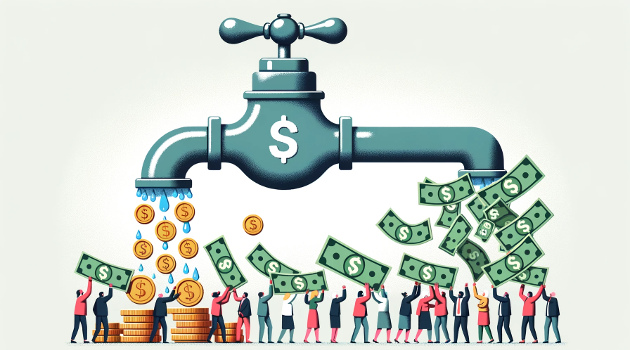Paul Krugman isn’t always wrong. A few years ago, for instance, he admitted the Laffer Curve is real.
And he even once wrote something sensible about tax policy.
But those are the exceptions. His usual routine is to pontificate in favor of bigger government.
Which drives him to make weak attacks on Reaganomics and weak defenses of Bidenomics.
And his ideological zeal leads him to make errors (often about U.S. data, but also about what’s happened in Canada, Germany, Estonia, the PIIGS, Denmark, and the United Kingdom).
Today, we are going to look at an example of him pursuing his goal of bigger government.
Here’s some of what he wrote in his latest column for the New York Times.
…one piece of the economic picture that’s worrisome: Long-term interest rates have gone up a lot since early 2002, especially over the past six months… It’s not a crisis, at least not yet. But in a better world we’d be taking action to bring interest rates down in a sustainable way. In particular, now would be a good time to rein in budget deficits. …To make room for lower interest rates, then, we would need to take some heat out of the economy in another way — most obviously by reducing the budget deficit.
Since Krugman is an unabashed supporter of Keynesian economics, you may be wondering about his sudden embrace of deficit reduction.
He tries to preemptively address that issue.
…some readers may be surprised to hear me saying that. After all, I spent a large part of the past 15 years inveighing against the deficit scolds… But there’s a big difference between obsessing over the budget deficit in, say, early 2013 and believing that we could use a lower deficit now. Back then, the interest rate on bonds protected against inflation risk was negative, so that investors were in effect paying the federal government to take their money. Now that rate is 2.4 percent. So it makes much more sense to be worried about borrowing now.
Needless to say, there were many people who pointed out that borrowing when interest rates were low was a risky strategy when those loans would have to be rolled over in the future when interest rates were higher.
Such as today.
But let’s set that issue aside and get to Krugman’s real point.
He wants America to become a high-tax European-style welfare state, even though that means much lower living standards.
The United States has a much weaker social safety net than other advanced economies, reflecting low government social spending… But what about the deficit? Well, there’s an obvious answer: Collect more taxes. America is in fact a very low-tax nation compared with Europe…while Democrats are at least willing to tax the rich, that by itself won’t be enough (although it would help)…they aren’t willing to take the political heat for proposing tax hikes on the middle class.
I’ll close by venturing a guess that Krugman is like me in that neither one of us is overly fixated about deficits.
But we have a giant difference in that I want smaller government and lower taxes, regardless of whether deficits are small or large.
And he wants bigger government and higher taxes, regardless of whether deficits are small or large.
P.S. Notice, by the way, that Krugman (again) endorsed higher taxes on lower-income and middle-class household. So give him credit for being an honest leftist.
P.P.S. But perhaps also a silly leftist.
P.P.P.S. I was unimpressed by his criticism of my analysis.


